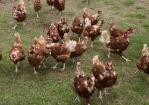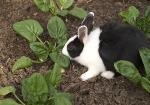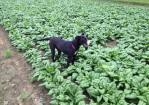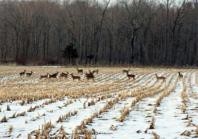FSMA Produce Safety Rule: Wildlife and Domesticated Animals
ID
FST-272NP
Overview
The Produce Safety Rule (PSR) is one of the seven food safety regulations that are part of the Food Safety Modernization Act (FSMA). The PSR sets a series of standards for the safe growing, harvesting, packing, and holding of produce grown for human consumption: 21 Code of Federal Regulations Part 112 (https://www.federalregister.gov/documents/2015/11/27/2015-28159/standards-for-the-growing-harvesting-packing-and-holding-of-produce-for-human-consumption). Similar to the other FSMA rules, the PSR aims to be proactive rather than reactive by focusing on high risk practices and identification of hazards within individual operations. For example, there are no requirements for uncontrollable factors, such as number of wildlife allowed in fields. Instead, the PSR mandates covered produce not be harvested when contaminated by feces (e.g., bird dropping on a tomato intended for fresh market). Standards are set for: agricultural water; biological soil amendments; sprouts; wildlife and domesticated animals; worker training, health and hygiene; equipment, tools, and buildings; among others. Here, we describe the PSR standards wildlife and domesticated animals.
Wildlife and Domesticated Animals

The PSR standards (subpart I) addresses both wildlife and domesticated animals. Animals, both wild and domesticated, may carry bacteria, viruses, or parasites that can make people sick. While animals are common in many locations and hard to control, the PSR standards stress the importance of growers limiting animal access to fields and not harvesting contaminated produce. Wildlife and domesticated animals include:

Domesticated animals – livestock, working animals, and pets, among others
Domesticated animals from a nearby farm/operation
Wild animals – deer, raccoons, boar, birds, fox, rodents, and reptiles, among others
The PSR standards for wildlife and domesticated animals apply to produce growing and handling areas, such as fields or partially enclosed buildings. The standards do not apply when activities take place in a fully-enclosed building. Pre-planting and pre-harvest assessments will help growers identify areas of high animal pressure (e.g., fields near forests, fields around waterfowl migration flyways) and adjacent land-uses (e.g., commercial feedlot, manure storage areas). If animal intrusion is observed in fields, it is required by the regulation to monitor those fields during the season (and immediately prior to harvest) for contaminated produce (e.g., feces on produce). Listed below are key standards.
Key Standards

1. Pets should be kept out of fields growing covered produce, unless they are considered working animals
2. If grazing or working animals are allowed in produce fields, growers should:
Wait an appropriate length of time between grazing and harvest based on a farm’s standard operating procedure
Minimize introduction of hazards from grazing or working animals in fields or on produce (i.e., what measures are used by growers to prevent contamination from feces or urine are in place)
3. If wild animals are likely to enter produce fields, growers should monitor/document the evidence of entry and evaluate whether the produce is safe enough to be harvested (remember covered produce cannot be harvested if fecal contamination is present)

Evidence of intrusion may be crop damage or animal tracks
- Monitoring should occur during the season, and immediately prior to harvest
4. The PSR has no requirements of farms to harm or kill endangered species, destroy animal habitat and/or clearing farm borders from produce fields or drainage areas (the PSR encourages growers to strike a balance between food safety and the environment, also known as co-management)
Records
Records must be kept for worker training on wildlife and domesticated animals (e.g., document workers have been trained on risks associated with animals, a farm’s policies regarding animals).
Depending on the farm operation/field situation, records may be kept for the following activities: pre-planting/pre-harvest assessments, monitoring of animal intrusion during the season, actions taken to reduce animal intrusion, and evidence of fecal contamination, among others.
Reference
US Food and Drug Administration Office of the Federal Registrar. 2016. Standards for the Growing, Harvesting, Packing and Holding of Produce for Human Consumption. Available from: https://www.gpo.gov/fdsys/pkg/FR-2015-11-27/pdf/2015-28159.pdf. Accessed March 17, 2017.
Virginia Cooperative Extension materials are available for public use, reprint, or citation without further permission, provided the use includes credit to the author and to Virginia Cooperative Extension, Virginia Tech, and Virginia State University.
Virginia Cooperative Extension is a partnership of Virginia Tech, Virginia State University, the U.S. Department of Agriculture (USDA), and local governments, and is an equal opportunity employer. For the full non-discrimination statement, please visit ext.vt.edu/accessibility.
Publication Date
September 29, 2022



